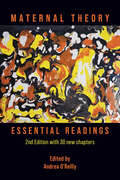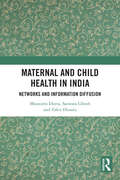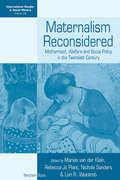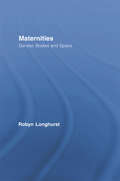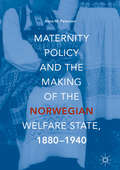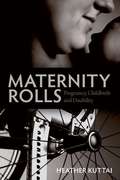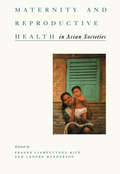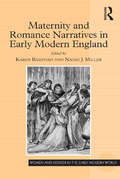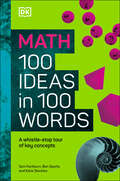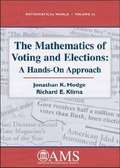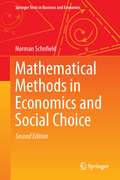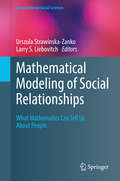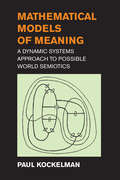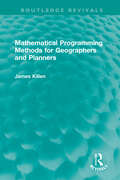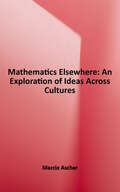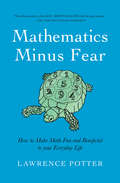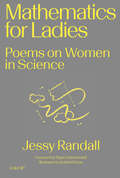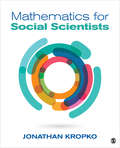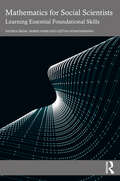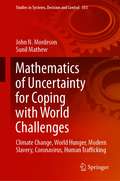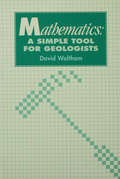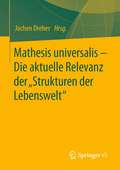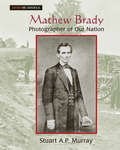- Table View
- List View
Maternal Theory: The Essential Readings
by Andrea O’ReillyTheory on mothers, mothering and motherhood has emerged as a distinct body of knowledge within Motherhood Studies and Feminist Theory more generally. This collection, The Second Edition of Maternal Theory: Essential Readings introduces readers to this rich and diverse tradition of maternal theory. Composed of 60 chapters the 2nd edition includes two sections: the first with the classic texts by Adrienne Rich, Nancy Chodorow, Sara Ruddick, Alice Walker, Barbara Katz Rothman, bell hooks, Sharon Hays, Patricia Hill-Collins, Audre Lorde, Daphne de Marneffe, Judith Warner, Patrice diQinizio, Susan Maushart, and many more. The second section includes thirty new chapters on vital and new topics including Trans Parenting, Non-Binary Parenting, Queer Mothering, Matricentric Feminism, Normative Motherhood, Maternal Subjectivity, Maternal Narratology, Maternal Ambivalence, Maternal Regret, Monstrous Mothers, The Migrant Maternal, Reproductive Justice, Feminist Mothering, Feminist Fathering, Indigenous Mothering, The Digital Maternal, The Opt-Out Revolution, Black Motherhoods, Motherlines, The Motherhood Memoir, Pandemic Mothering, and many more. Maternal Theory is essential reading for anyone interested in motherhood as experience, ideology, and identity.
Maternal and Child Health in India: Networks and Information Diffusion
by Zakir Husain Mousumi Dutta Saswata GhoshThis book examines the process of information diffusion and the challenges of spreading awareness about maternal and child health (MCH) outcomes in India, with a special focus on Bihar – a state in eastern India.Investing in the health of women and children results in significant and long-lasting economic and social benefits to society. Analysing the National Family Health Survey data, the volume explores the role that access to information has on the adoption of MCH practices. It also explores regional variations – between Empowered Action Group (EAG) states and non-EAG states and also across EAG states – in the impact of information networks. Using appropriate econometric methods, the authors study the role of peer effects and grass-roots health workers in bringing about a change in attitude within communities. The book looks at the process of information dissemination between the grass-roots health workers and the target women and brings to the forefront the intricacies of patriarchal family dynamics that hinder women from accessing basic maternal and child healthcare needs. Based on grass-roots experiences, the book provides sharp insights from the field for the benefit of researchers, policymakers, and activists.Rich in empirical data, this book will be of interest to academics and researchers of development economics, public health policy and practice, community health, healthcare administration and management, primary healthcare and family practice, and health and social care.
Maternalism Reconsidered
by Rebecca Jo Plant Nichole Sanders Marian van der Klein Lori R. WeintrobBeginning in the late 19th century, competing ideas about motherhood had a profound impact on the development and implementation of social welfare policies. Calls for programmes aimed at assisting and directing mothers emanated from all quarters of the globe, advanced by states and voluntary organizations, liberals and conservatives, feminists and anti-feminists - a phenomenon that scholars have since termed 'maternalism'. This volume reassesses maternalism by providing critical reflections on prior usages of the concept, and by expanding its meaning to encompass geographical areas, political regimes and cultural concerns that scholars have rarely addressed. From Argentina, Brazil and Mexico City to France, Italy, the Netherlands, the Soviet Ukraine, the United States and Canada, these case studies offer fresh theoretical and historical perspectives within a transnational and comparative framework. As a whole, the volume demonstrates how maternalist ideologies have been employed by state actors, reformers and poor clients, with myriad political and social ramifications.
Maternities: Gender, Bodies and Space (Routledge International Studies of Women and Place)
by Robyn LonghurstOver the past decade geographers have shown a growing interest in 'the body' as an important co-ordinate of subjectivity and as a way of understanding further relationships between people, place and space. To date, however geographers have published little on what is one of, if not the, most important of all bodies - bodies that conceive, give birth and nurture other bodies. It is time that feminist, social, and cultural geographers contributed more to debates about maternal bodies. This book offers a series of windows on the ways in which maternal bodies influence, and are influenced by, social and spatial processes. Topics covered include women ‘coming out’ as pregnant at work, changing fashion for pregnant women, being disabled and pregnant, the politics of home versus hospital birth, breastfeeding practices that sit outside the norm, women who are constructed as ‘bad’ mothers, and ‘e-mums’ (mothers who go on-line).
Maternity Policy and the Making of the Norwegian Welfare State, 1880-1940
by Anna M. PetersonThis book traces women’s influence on maternity policy in Norway from 1880-1940. Maternity policies, including maternity leave, midwifery services and public assistance for mothers, were some of the first welfare policies enacted in Norway. Feminists, midwives, and working women participated in their creation and helped transform maternity policies from a restriction to a benefit. Situating Norway within the larger European context, the book contributes to discussions of Scandinavian welfare state development and further untangles the relationship between social policy and gender equality.The study of poor, rural women alongside urban middle-class feminists is rooted in an inclusive archival source base that speaks to the interplay between local and national welfare officials and recipients, the development and implementation of laws in diverse settings, the divergent effects maternity policies had on women, and women’s varied response.
Maternity Rolls: Pregnancy, Childbirth and Disability
by Heather KuttaiThe author, a paraplegic, tells about her own hunt for medical advice before getting pregnant--and then about the normal births of her two children--before widening the conversation to other disabled women and sympathetic members of the medical community.
Maternity and Reproductive Health in Asian Societies
by Lenore Manderson Pranee Liamputtong RiceThis collection examines enduring and topical questions in sexual and reproductive health in a range of contemporary Asian cultures. Beliefs and practices surrounding conception, pregnancy, birth, and confinement are studies in culturally specific contexts in Japan, Taiwan, the Philippines, Thailand, Laos, Cambodia, and Indonesia. Important and widely applicable health issues are also addressed, including the perception and management of HIV/AIDS, experiences of menopause and the interaction of cosmopolitan ("western'') medicine with traditional healthcare.
Maternity and Romance Narratives in Early Modern England (Women and Gender in the Early Modern World)
by Karen Bamford Naomi J. MillerThough recent scholarship has focused both on motherhood and on romance literature in early modern England, until now, no full length volume has addressed the notable intersections between the two topics. This collection contributes to the scholarly investigation of maternity in early modern England by scrutinizing romance narratives in various forms, considering motherhood not as it was actually lived, but as it was figured in the fantasy world of romance by authors ranging from Edmund Spenser to Margaret Cavendish. Contributors explore the traditional association between romance and women, both as readers of fiction and as tellers of ’old wives’ tales,’ as well as the tendency of romance plots, with their emphasis on the family and its reproduction, to foreground matters of maternity. Collectively, the essays in this volume invite reflection on the uses to which Renaissance culture put maternal stereotypes (the virgin mother, the cruel step-dame), as well as the powerful fears and desires that mothers evoke, assuage and sometimes express in the fantasy world of romance.
Math 100 Ideas in 100 Words: A Whistle-stop Tour of Science’s Key Concepts
by DKGet to grips with the essential topics in maths today through 100 key ideas, each one explained clearly in 100 words.Math: 100 Ideas in 100 Words offers the essential facts at your fingertips, satisfying your mathematical curiosity and helping you to understand the biggest concepts in math in concise, 100-word summaries. One of the first titles in a cutting-edge new series created in partnership with The Science Museum, this book introduces 100 key areas of math such as geometry, algebra, probability and pure math, and explains each topic in just 100 words. Perfect for getting your head around big ideas clearly and quickly, or refreshing your memory of the fundamentals of math, this book covers the most up-to-date terms and theories and inspires a heightened level of understanding and enjoyment to the core areas of math.
Math in FocusTM: The Singapore Approach, Student Book, 5A
by Fong Ho Kheong Chelvi Ramakrishnan Gan Kee SoonNIMAC-sourced textbook
Math of Voting and Elections: A Hands-on Approach
by Jonathan K. Hodge Richard E. KlimaThis book is devoted to the mathematics of politics and social choice and is a junior /senior level course aimed at students from a variety of mathematical backgrounds.
Mathematical Methods in Economics and Social Choice
by Norman SchofieldIn recent years, the usual optimization techniques, which have proved so useful in microeconomic theory, have been extended to incorporate more powerful topological and differential methods, and these methods have led to new results on the qualitative behavior of general economic and political systems. These developments have necessarily resulted in an increase in the degree of formalism in the publications in the academic journals. This formalism can often deter graduate students. The progression of ideas presented in this book will familiarize the student with the geometric concepts underlying these topological methods, and, as a result, make mathematical economics, general equilibrium theory, and social choice theory more accessible.
Mathematical Modeling of Social Relationships: What Mathematics Can Tell Us About People (Computational Social Sciences)
by Larry S. Liebovitch Urszula Strawinska-ZankoThis edited volume presents examples of social science research projects that employ new methods of quantitative analysis and mathematical modeling of social processes. This book presents the fascinating areas of empirical and theoretical investigations that use formal mathematics in a way that is accessible for individuals lacking extensive expertise but still desiring to expand their scope of research methodology and add to their data analysis toolbox. Mathematical Modeling of Social Relationships professes how mathematical modeling can help us understand the fundamental, compelling, and yet sometimes complicated concepts that arise in the social sciences. This volume will appeal to upper-level students and researchers in a broad area of fields within the social sciences, as well as the disciplines of social psychology, complex systems, and applied mathematics.
Mathematical Models of Meaning: A Dynamic Systems Approach to Possible World Semiotics
by Paul KockelmanA mathematical model of meaning that captures the dynamics and diversity of meaning-oriented agents.In Mathematical Models of Meaning, Paul Kockelman offers answers to the following kinds of questions: What is meaning? What is the relation between meaning, information, value, and purpose? What ingredients are necessary for a system to exhibit meaning? What behaviors, and capacities for behavior, are particular to meaning-oriented agents? Is there a relatively simple mathematical model that can adequately capture the dynamics—and diversity—of meaning-oriented agents? And finally, how can we best bridge the divide between interpretive paradigms that are qualitative and context rich and formal methods that are quantitative and domain general?Partially grounded in a pragmatist approach, this book rethinks the semiotic, statistical, and logical currents of Charles Sanders Peirce&’s thought in relation to more recent developments in allied traditions. Putting possible worlds, as well as social relations, at the center of significance, it focuses on the emergence of meaningful behavior among relatively distributed agents that choose in real time, learn over developmental time, or evolve over phylogenetic time.
Mathematical Programming Methods for Geographers and Planners (Routledge Revivals)
by James KillenOriginally published in 1983, this was the first text to offer an in-depth treatment of mathematical programming methods explained from first principles. It considers all the major programming techniques and fully explains key terms, illustrates theories with detailed examples and shows how the various skills are applied in practice. It will be invaluable in both the academic world and to policy formulators and planners, who make extensive use of the methods described.
Mathematics Elsewhere: An Exploration of Ideas Across Cultures
by Marcia AscherMathematics Elsewhere is a fascinating and important contribution to a global view of mathematics. Presenting mathematical ideas of people from a variety of small-scale and traditional cultures, it humanizes our view of mathematics and expands our conception of what is mathematical. Through engaging examples of how particular societies structure time, reach decisions about the future, make models and maps, systematize relationships, and create intriguing figures, Marcia Ascher demonstrates that traditional cultures have mathematical ideas that are far more substantial and sophisticated than is generally acknowledged. Malagasy divination rituals, for example, rely on complex algebraic algorithms. And some cultures use calendars far more abstract and elegant than our own. Ascher also shows that certain concepts assumed to be universal--that time is a single progression, for instance, or that equality is a static relationship--are not. The Basque notion of equivalence, for example, is a dynamic and temporal one not adequately captured by the familiar equal sign. Other ideas taken to be the exclusive province of professionally trained Western mathematicians are, in fact, shared by people in many societies. The ideas discussed come from geographically varied cultures, including the Borana and Malagasy of Africa, the Tongans and Marshall Islanders of Oceania, the Tamil of South India, the Basques of Western Europe, and the Balinese and Kodi of Indonesia. This book belongs on the shelves of mathematicians, math students, and math educators, and in the hands of anyone interested in traditional societies or how people think. Illustrating how mathematical ideas play a vital role in diverse human endeavors from navigation to social interaction to religion, it offers--through the vehicle of mathematics--unique cultural encounters to any reader.
Mathematics Minus Fear: How to Make Math Fun and Beneficial to Your Everyday Life
by Lawrence PotterForget your classroom nightmares and discover how numbers can enhance and illuminate your world!How can math help you bet on horses or win in Vegas? What's the foolproof way to solve Sudoku? How can probability teach you to calculate your chances of survival in Russian roulette?In this irreverent and entertaining guide to mathematics, Lawrence Potter takes the fear out of everything from long division to percentages. Using fascinating puzzles and surprising examples, he shows us how math is connected with the world we encounter every day, from how the VAT works to why weather forecasts are wrong, from winning at Monopoly to improving your mental arithmetic. Along the way you'll also discover who invented numbers, whether animals can count, and what nuns have to do with multiplication.
Mathematics for Ladies: Poems on Women in Science (Goldsmiths Press / Gold SF)
by Jessy RandallPoems about historical women in STEM fields.Hilarious, heart-breaking, and perfectly pitched, these carefully researched poems about historical women in science, technology, engineering, mathematics, and medicine will bring you to both laughter and outrage in just a few lines. A wickedly funny, feminist take on the lives and work of women who resisted their parents, their governments, the rules and conventions of their times, and sometimes situations as insidious as a lack of a women&’s bathroom in a college science building. Discover seashells by the seashore alongside Mary Anning and learn how Elizabeth Blackwell lost her eye. Read about Bertha Pallan&’s side hustle in the circus, Honor Fell bringing a ferret to her sister&’s wedding, Annie Jump Cannon cataloguing stars, Mary G. Ross stumping the panel on &“What&’s My Line?,&” Alice Ball&’s cure for leprosy, and Roberta Eike stowing away on a research vessel. Some of these poems celebrate women who triumphed spectacularly. Others remember women who barely survived. Explore the stories of women you may have heard of (Marie Curie, Jane Goodall, Émilie du Châtelet) alongside those of others you may not (Virginia Apgar, Maryam Mirzakhani, Ynes Mexia, Susan La Flesche Picotte, Chien-Shiung Wu). If you have come across Randall&’s poems in Scientific American, Analog, or Asimov&’s, you will have already opened the door to these tales, all the more extraordinary because they are true.Illustrated with Kristin DiVona&’s portraits for NASA&’s &“Reaching Across the Stars&” project, this is a book to share with scientists, feminists, and poets, young and old and of any gender.
Mathematics for Social Scientists
by Jonathan M. KropkoWritten for social science students who will be working with or conducting research, Mathematics for Social Scientists offers a non-intimidating approach to learning or reviewing math skills essential in quantitative research methods. The text is designed to build students’ confidence by presenting material in a conversational tone and using a wealth of clear and applied examples. Author Jonathan Kropko argues that mastering these concepts will break students’ reliance on using basic models in statistical software, allowing them to engage with research data beyond simple software calculations.
Mathematics for Social Scientists
by Jonathan M. KropkoWritten for social science students who will be working with or conducting research, Mathematics for Social Scientists offers a non-intimidating approach to learning or reviewing math skills essential in quantitative research methods. The text is designed to build students’ confidence by presenting material in a conversational tone and using a wealth of clear and applied examples. Author Jonathan Kropko argues that mastering these concepts will break students’ reliance on using basic models in statistical software, allowing them to engage with research data beyond simple software calculations.
Mathematics for Social Scientists: Learning Essential Foundational Skills
by Shobha Bagai Amber Habib Geetha VenkataramanThis book helps readers bridge the gap between school-level mathematical skills and the quantitative and analytical skills required at the professional level. It presents basic mathematical concepts in an everyday context, enabling readers to pick up skills with ease.Mathematics for Social Scientists:• Focuses on building foundational skills in reasoning, data analysis and quantitative methods that are a requisite for progressing to higher levels;• Helps readers express mathematical ideas in the form of sets, analyse arguments and their validity mathematically, interpret and handle data, and understand the concept and use of probability;• Includes a dedicated chapter on symmetry, perspective and art to encourage readers to reason, model and objectively evaluate everyday situations.The volume will be useful to students of various disciplines in Social Sciences and Liberal Arts. It will also be an invaluable companion to practitioners of social sciences, humanities and life sciences, as well as schoolteachers at the middle and higher secondary level.
Mathematics of Uncertainty for Coping with World Challenges: Climate Change, World Hunger, Modern Slavery, Coronavirus, Human Trafficking (Studies in Systems, Decision and Control #353)
by John N. Mordeson Sunil MathewThis book ranks countries with respect to their achievement of the Sustainable Development Goals and their vulnerability to climate change. Human livelihoods, stable economies, health, and high quality of life all depend on a stable climate and earth system, and a diversity of species and ecosystems. Climate change significantly impacts human trafficking, modern slavery, and global hunger. This book examines these global problems using techniques from mathematics of uncertainty. Since accurate data concerning human trafficking and modern slavery is impossible to obtain, mathematics of uncertainty is an ideal discipline to study these problems. The book also considers the interconnection between climate change, world hunger, human trafficking, modern slavery, and the coronavirus. Connectivity properties of fuzzy graphs are used to examine trafficking flow between regions in the world. The book is an excellent reference source for advanced undergraduate and graduate students in mathematics and the social sciences as well as for researchers and teachers.
Mathematics: A Simple Tool For Geologists
by Waltham, D.Uses geological examples to illustrate mathematical ideas. Contains a large number of worked examples, and problems for students to attempt themselves. Answers to all the questions are given at the end of the book.
Mathesis universalis – Die aktuelle Relevanz der „Strukturen der Lebenswelt“
by Jochen DreherDie Beiträge des Bandes setzen sich mit den „Strukturen der Lebenswelt“ als Analyseinstrument für phänomenologisch-sozialwissenschaftliche Forschungen auseinander. Zum einen werden die „Strukturen der Lebenswelt“ insbesondere Thomas Luckmann zufolge in Anlehnung an Edmund Husserl als mathesis universalis verstanden, die eine elementare Struktur allen menschlichen Verhaltens darstellt und somit als tertium comparationis für die empirische, sozio-historisch ausgerichtete Sozialforschung dient. Die phänomenologische Beschreibung der Lebenswelt muss als „Protosoziologie“ verstanden werden, die das Problem der Vergleichbarkeit historischer Daten löst. Phänomenologie und Soziologie gleichen in diesem Sinne in einer „Parallelaktion“ ihre Erkenntnisse ab, indem die erkenntnistheoretische phänomenologische Fundierung die soziologische empirische Rekonstruktion absichert. Zum anderen wird im Anschluss an Schütz/Luckmann vor allem im US-amerikanischen Kontext die Variante einer „phänomenologischen Soziologie“ vorgeschlagen, die auf das Verstehen, Beschreiben und Analysieren der Lebenswelt abzielt, so wie sie von denjenigen erfahren wird, die in ihr leben. In einer Abgrenzung vom Positivismus und Behaviorismus wird die Suspension der natürlichen Einstellung, die Aufdeckung verdeckter Hintergrundannahmen eingefordert und zum Sehen-der-Phänomene-wie-sie-sind – etwa im Sinne von Harold Garfinkels Ethnomethodologie – aufgerufen.
Mathew Brady: Photographer of Our Nation
by Stuart A MurrayIn a spellbinding account of her two-year teaching stint and travels in China, Woronov provides, through numerous anecdotes, insight into the everyday life of the modern Chinese people. 20 photos.
